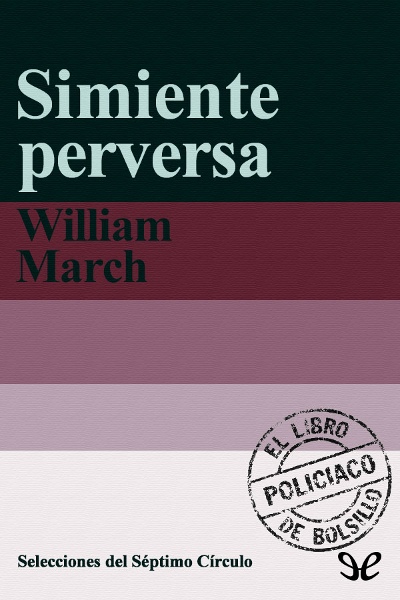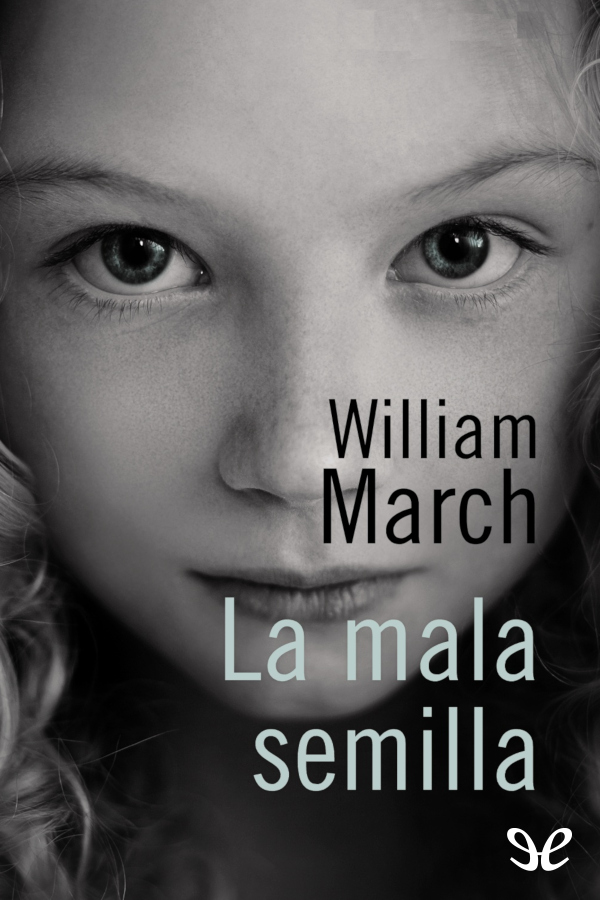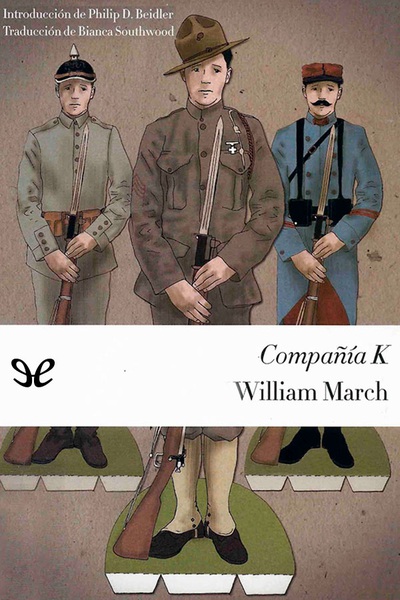oleebook.com
The Bad Seed de William March
de William March - Género: English
Sinopsis
The bestselling novel that inspired Mervyn LeRoys classic horror film about the little girl who can get away with anythingeven murder.
Theres something special about eight-year-old Rhoda Penmark. With her carefully plaited hair and her sweet cotton dresses, shes the very picture of old-fashioned innocence. But when their neighborhood suffers a series of terrible accidents, her mother begins to wonder: Why do bad things seem to happen when little Rhoda is around?
Originally published in 1954, William Marchs final novel was an instant bestseller and National Book Award finalist before it was adapted for the stage and made into a 1956 film. The Bad Seed is an indelible portrait of an evil that wears an innocent face, one which still resonates in popular culture today.
With a new foreword by Anna Holmes.
Vintage Movie Classics spotlights classic films that have stood the test of...
Descargar
Descargar The Bad Seed ePub GratisLibros Recomendados - Relacionados
Reseñas Varias sobre este libro
The Bad Seed by William March is a 1972 Dell publication. This book was originally published in 1954.
Evil children can be found in literature, going back centuries. Matilda from The Monk by Matthew Lewis ,written back in 1796, for example. However, evil children became a popular horror novel trope beginning in the fifties and reaching an epic peak in the seventies.
Evil children still make an appearance in movies and novels, never completely going out of style, and of course, are not solely confined to the horror or thriller categories.
If you do a Google search for a list of Evil Children in literature, youll get an eclectic, and interesting group of lists. However, there is always one child that makes the list every single time: little Rhoda Penmark.
I read this book decades ago, and later watched the 1956 film version. While I remembered the basics of the story, Id forgotten most of the finer details that made this book such a fantastic thriller. Im glad I picked this one as part of my October/Halloween reading this year. Its not a supernatural thriller, but is spine tingling, and hair raising, all the same- even after all these years.
It seemed to her than violence was an inescapable factor of the heart, perhaps the most important factor of all- an ineradicable thing that lay, a bad seed, behind kindness, behind compassion, behind the embrace of love itself. Sometimes it lay deeply hidden, sometimes it lay close to the surface; but always it was there, ready to appear, under the right conditions, in all its irrational dreadfulness.
With her husband away on business for an entire summer, Christine is alone with her smart, clever, and precocious, eight -year old daughter, Rhoda. The summer gets off to a tragic beginning, when a little boy in Rhodas class dies. Christina begins to have dark thoughts about her daughters peculiar behavior, which sparks a sudden keen interest in crimes and those who commit serial murder. As Christine becomes more aware of her daughters lack of conscience, the coldness in her, she becomes increasingly anxious. This does not go unnoticed by Christines neighbor, who thinks the world of her and Rhoda.
The deeper Christine researches the mind of murderers, especially female serial killers, she begins to trace her own family tree, which reveals a horrible, shocking truth. Can evil be inherited?
Its the classic debate of nature versus nurture.
I am so glad I put everything down and gave this sinister little book another look. I was struck by many things this second time around that my younger self wouldnt have pondered on for too long, or noticed at all, taking everything at face value ironically.
The book seems a little ahead of its time and tackled some feminist topics we still face today. Except for Leroy, the female characters outnumber the males and are far more dominant. The psychology, especially in the 50s, is very interesting, and the killers Christine researched were real life murderers, several of whom Id never heard of. This, of course, required some internet investigations, and informed me of some rather shocking true crime cases!
Now that weve all become so jaded, a book this one wouldnt raise eyebrows today, as it is all too obvious. But, in the fifties, the female criminal is still considered rare, and forget about suspecting such an adorable, innocent looking little girl of being a cold -blooded killer. But, what makes this book so effective, and still quite chilling, even by todays desensitized viewpoint, is the calculation and mannerisms Rhoda exhibits, and the cluelessness of everyone around her.
Not only that, it raised pertinent questions about inherited proclivities, and a examines the shrewd, diabolical mind a sociopath, who plans and carries out premeditated crimes without the slightest bit of remorse. Im still impressed with this book, despite its predictable nature. This is a novel that set a president, a trend-setter, and helped spawn an entire trope, both in books and movies, featuring sinister, evil children.
But, more importantly, we are reminded that looks can be deceiving, that evil has many faces, and despite their cherubic little faces and adorable giggles, even children can not be presumed innocent.
4 stars2018 classics from-my-personal-collection ...more154 s Dem1,217 1,305
When a thriller written in 1954 crosses your path and you take a chance on it and happen to really enjoy it, it can only be described as finding an unopened Christmas Gift in the middle of July.
The Bad Seed is a 1954 novel by American Writer William March and tells the story of a mothers realization that her young daughter has committed murder.
A short but chilling and suspenseful piece of fiction that really held my interest as is as relevant now as it was back in 1954. What happens when an ordinary family realize their their child may have committed murder and what painful questions must a parent ask themselves. Can evil exist in a child so young and can a parent miss the signs or choose to ignore them.
I loved the character development in this novel especially of the main characters as you get a sense of who they are in a short space of time which is down to good writing on the authors part.
I listened to this one on audible and I honestly cant recommend it as I found the voices too over played for the story and felt the narrators more suitable for an episode of Little House On the Prairie - especially the character of Mrs Olseson so I would recommend purchasing a hard copy of this one as the narration is too dramatized.
A fast paced short thriller that had my attention from the very first line.psychological-thrillers96 s Arah-Lynda337 592
It seemed to her suddenly that violence was an inescapable factor of the heart, perhaps the most important factor of all - an ineradicable thing that lay, a bad seed, behind kindness, behind compassion, behind the embrace of love itself. Sometimes it lay deeply hidden, sometimes it lay close to the surface, but always it was there, ready to appear, under the right conditions, in all its irrational dreadfulness.
How many of you I wonder remember or have seen the 1956 movie classic based on the novel starring Nancy Kelly, Patty McCormack and William Hopper. I was still a child when I first saw it and it made a lasting impression, I was terrified and it was not because of some demented clown or blood thirsty vampire, no I was petrified of a seemingly sweet and beautiful, golden haired child who was about the same age I was. And I remember very well trying to hide or cover up this fear as my parents were reluctant to let me watch it in the first place. If I was ever going to be allowed to see this kind of thing again it was paramount that I remain unaffected. It was only many years later that I learned that my apparent cool demeanor left my parents more than a little disconcerted.
So here we have a case where the memories of this movie eventually led me to the book. I was not disappointed.
A true thriller from yesteryear, The Bad Seed is the story of a child serial killer. Her name is Rhoda Penmark and as the story opens, it would seem that nobody save Rhoda is aware of her evil side. What they see is a sweet and precocious girl who seems almost to good to be true.
But then terrible things begin to happen and it is odd that Rhoda always happens to be right there. Her mother, Christine begins to think about earlier disturbing events surrounding Rhoda and starts to question things. Meanwhile distressing reports come in from the prestigious school that Rhoda attends. And even more alarming discoveries are made, hidden among Rhodas things.
Imagine, if you will for just a moment, that slowly, over time, you discovered incontrovertible proof that your child was in fact a cold blooded killer.
Positively chilling, The Bad Seed is an intelligent, spine tingling thriller that withstands well the test of time. Guaranteed to raise your hackles!
But the little girl was not to be diverted from her game. She did a little pirouette, curtseyed, and said What will you give me Father? What will you give me if I give you a basket of kisses?i-said lets-get-real paperwhite94 s Maureen 1,571 7,014
*3.5 stars *
86 s Beverly893 352
The Bad Seed is a riveting, engulfing read. I have seen the 1956 movie version many times and really d it. I didn't even know there was a book until recently. The book is well researched and well written with characters who stay with you especially the vacilating, weak mother, Christine, the malevolent, cold daughter Rhoda, the landlady and busybody, Mrs. Breedlove, and Leroy, the odious groundskeeper. The author includes stories of real life killers under the guise of a mystery writer friend who keeps files of such things.
Many have written since the book was published that a tendency to kill is not an inherited trait which is the basis of the book. The lack of compassion or empathy in a child and one who starts out killing animals, as Rhoda does in the story, are signs of a psychopath though. The book includes a lot more going on beneath the surface, than the movie, such as the perverse attraction that Leroy has for Rhoda. And there is a lot more killing in the book.
The author also takes advantage of our culture's obsession with beauty, this pretty little girl is overlooked by those closest to her and made allowances for, because she looks and behaves beautifully. Only her teachers and other children have glimpsed the monster beneath the mask. Her seemingly ordinary and polite behavior is a charade she had learned through the years to mirror emotions she is incapable of feeling.This entire review has been hidden because of spoilers.Show full review79 s Fabian977 1,937
I always try to discover the Goth elements within beloved horror classics. There is but a few of them, and so I do this in order to find the true American thread: that of Gothic Horror, found from New World horror fables to Hawthorne; from Poe to Norman Bates. What makes them American, what makes them monstrous? Why are they still relevant? Why are they still imitated and remade?
The Bad Seed is "The Good Son." It is "The Omen." Guess it's this year's "Hereditary."
Except it came first. And for the themes to include homicide by infant, well, it was avant garde, no? For tea ladies to have a book club, for that book to be about a murderous imp!
William March writes similarly to James M. Cain--the mid 50s were a simple time of pulp plots and killer dames. But he's not always exciting--he lingers in the domestic details that are dull as hell. But I guess its to offset the fact that evil bloodlines exist. Especially in idyllic America.
The best surprises: Horrific anecdotes of bloody murder; the picture of a matriarch gettin' roasted in the electric chair.65 s Classic reverie1,636
I decided it was time to read William March's The Bad Seed, though this Kindle edition was bought long ago, after seeing the 1956 version by Mervyn Leroy last weekend.
All excerpts are from this edition.
"Movie Adaptation of William Marchs THE BAD SEED 1956: Produced by Warner Bros. Directed by Mervyn LeRoy. Starring Nancy Kelly, Patty McCormack, and Eileen Heckart. Screenplay by John Lee Mahin. Academy Award nominee for Best Actress, Best Actress in a Supporting Role (both McCormack and Heckart were nominated), and Best Cinematography, Black-and-White. "
A little bit about the author.
"William March (18931954), born William Edward March Campbell in Mobile, Alabama, was an American novelist and short-story writer. He served in the Marines during World War I and was recognized with the Distinguished Service Cross, the Navy Cross, and the Croix de Guerre. His first novel, Company K, was based largely on his wartime experiences. A prolific writer of short stories, he was a four-time winner of the O. Henry Prize. The Bad Seed was an immediate critical and commercial success, the source for a Tony Awardwinning Broadway play, and a finalist for the National Book Award. Sadly, March died of a heart attack just weeks after publication. "
I come away from this book and the movie in a lesser degree with horror of the evil tendency and actual evil ways of some. The book had a more chilling effect on me, though the movie was quite an excellent in its portrayal, it did not go into certain details and feelings that the mother had for her daughter when she comes to the point of no return concerning the evil doing and other factors described. In the spoiler section at the end I will compare and contrast the movie and the book.
Before going on more I wanted to comment on this quote from the Foreword.
"It probably says something about the evolution in attitudes about gender and girlhoodnot to mention mental illness and sociopathythat William Marchs book would be unly to have the same chilling or shocking effect were it published for the first time today. For one thing, our ideas about good and evil have been complicated and expanded upon thanks to advances in the fields of psychology and criminology, not to mention child development. "
Maybe this had a chilling effect on me because of the idea of evil vs. good which to me is not an "evolution in attitudes" that has complicated the two into a gray area. I think society has taken a step towards looking at evil more normal that it should be; that good goes into the gray area making things unclear but for continual excuses of behavior. Is there mental illness? Of course but there is human tendency in all that must reach for the good and not give way to the evil that should remain dormant. When society has story after story, movie after movie, and yes book after book with such that things are not clear but muddled, is society to benefit? Are there truly people that are born bad, "bad seeds"? I certainly think so. Can they be helped? Some many but many may not. What does society do? It has to wait because someone's mind is not known but actions are known and bad thoughts without action are not a crime; but only to God.
You can certainly disagree with me.
I suppose it was the time when authors to push buttons on the reading public with the talk of sex and psychoanalysis which goes along this line. Leroy's comments about the women around him and what they need. This was not my favorite part but I suppose it laid out the characters but in my opinion, not necessary.
For those who are "true crime" fans the discussion on this subject and the many real names mentioned might add to your enjoyment. Though this book was chilling I found it a thoughtful wonderful read about a mother who must come to terms with what life sent her way.
The story in short - Christine Penmark must care for her daughter herself while her husband is working far away. Neighbors help her take care of her young daughter, Rhoda who seems to have manners in perfection but they do not know what her mother knows especially about a little boy who has drowned at a class picnic.
I wanted to add this quote from another author and book written 100 years or so before The Bad Seed, that sums up a bad seed of a person.
In most criminals, however abandoned, there are touches of humanity, relics of virtue; and the true delineator of mankind often incurs the taunt of bad hearts and dull minds, for showing that even the worst alloy has some particles of gold, and even the best that come stamped from the mint of Nature have some adulteration of the dross. But there are exceptions, though few, to the general rule, exceptions, when the conscience lies utterly dead, and when good or bad are things indifferent but as means to some selfish end. So was it with the protege of the atheist. Envy and hate filled up his whole being, and the consciousness of superior talent only made him curse the more all who passed him in the sunlight with a fairer form or happier fortunes.
Edward Bulwer-Lytton's Zanoni
Autor del comentario:
=================================



